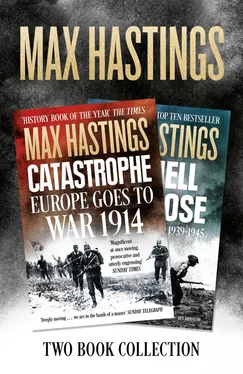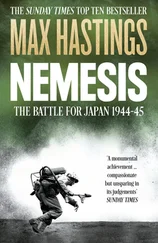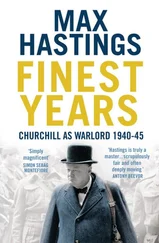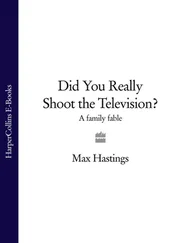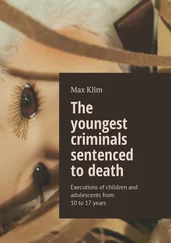It may be useful to explain how this book was written. I began by rereading Gerhard Weinburg’s A World at Arms and Total War by Peter Calvocoressi, Guy Wint and John Pritchard, probably the two best single-volume histories of the war. I then composed a skeleton narrative, setting the most important events in sequence, and laid upon it the flesh of anecdotage and my own reflections. When I had completed a draft, I revisited some other outstanding recent accounts of the conflict: Richard Overy’s Why the Allies Won, Allan Millett and Williamson Murray’s There’s a War to be Won and Michael Burleigh’s Moral Combat. I thus reviewed my own comments and conclusions in the light of theirs.
Wherever possible, I have favoured relatively obscure anecdotage at the expense of justly celebrated personal recollections – omitting, for instance, the likes of Richard Hillary’s The Last Enemy and George Macdonald Fraser’s Quartered Safe out Here. Dr Lyuba Vinogradova, who has researched my Russian material for the past decade, for this work once again identified and translated personal narratives, diaries and letters. Serena Sissons has translated thousands of words from Italian memoirs and diaries, because Mussolini’s people seem to me inadequately represented in most Anglo-Saxon narratives. I have explored unpublished Polish accounts in the Imperial War Museum archive and London’s Sikorski Institute. I am once again indebted to Dr Tami Biddle of the US Army War College at Carlisle, Pennsylvania, for insights and documents derived from her own researches, which she has generously shared with me. Various friends, notable among them Professor Sir Michael Howard, Dr Williamson Murray and Don Berry, have been kind enough to read my draft manuscript and make invaluable corrections, suggestions and comments. The doyen of British naval historians, Professor Nicholas Rodger of All Souls College, Oxford, read the chapter on the British experience at sea, much to the advantage of my final text. Richard Frank, doyen of US Pacific historians, identified an alarming catalogue of egregious mistakes in my draft, for which I am deeply grateful. None of these, of course, bears any responsibility for my judgements and errors.
Any writer’s highest aspiration, more than sixty-five years after the war’s ending, is to offer a personal view rather than a comprehensive account of this greatest and most terrible of all human experiences, which never fails to inspire humility in its modern students, inspired by gratitude that we have been spared anything comparable. In 1920, when Colonel Charles à Court Repington, military correspondent of the Daily Telegraph, published a best-selling account of the recent conflict, it was considered sinister and tasteless that he chose as his title The First World War, for it presumed another. To call this book The Last World War might tempt providence, but it is at least certain that never again will millions of armed men clash on European battlefields such as those of 1939–45. The conflicts of the future will be quite different, and it may not be rashly optimistic to suggest that they will be less terrible.
MAX HASTINGS
Chilton Foliat, Berkshire, and Kamogi, Kenya, June 2011
Конец ознакомительного фрагмента.
Текст предоставлен ООО «ЛитРес».
Прочитайте эту книгу целиком, купив полную легальную версию на ЛитРес.
Безопасно оплатить книгу можно банковской картой Visa, MasterCard, Maestro, со счета мобильного телефона, с платежного терминала, в салоне МТС или Связной, через PayPal, WebMoney, Яндекс.Деньги, QIWI Кошелек, бонусными картами или другим удобным Вам способом.
